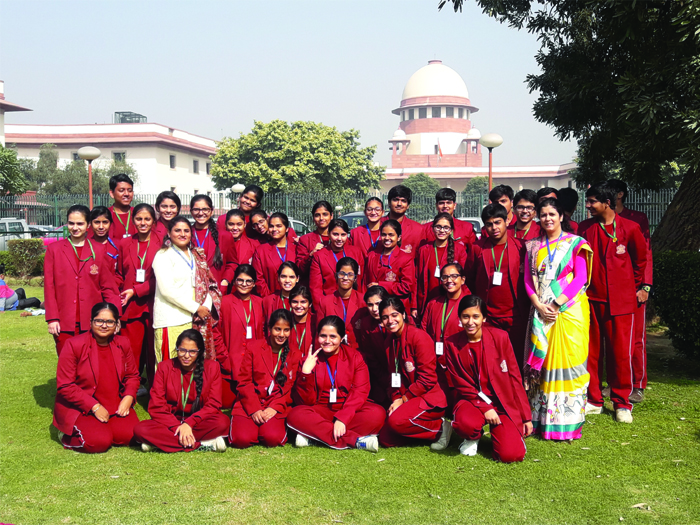Visit to the Supreme Court- class 11 ( Humanities)
Courts are regarded as the temples of justice. Any person who is aggrieved by the acts of another takes recourse in the courts for justice. Every political science student who intends to pursue a career in this field and is a politically aware citizen, must make a visit to the Apex Court of India.
Keeping this in mind 49 students of class 11 ( Humanities) were given an opportunity to visit the Supreme Court on 23rd November, 2017. The aim of this visit was to support legal education through live experiences at court.

The students were to conduct a survey in the Supreme Court premises and interview lawyers at random on topics of contemporary relevance. It was an extremely insightful for the students to experience speaking and recording varied arguments on diverse topics pertaining to law and legal situations in our country. After a brief survey on the court grounds the students were guided to the Supreme Court museum where too they learnt from the displays they viewed.
The Supreme Court museum is divided into two sections. The first section deals with the evolution and development of the judiciary in India while the second deals with the federal court and the Supreme Court. The students viewed exhibits of the history of the Indian legal system from the British period, Harappan seals the Ashokan edict and a Nalanda copper plate from the 9th century.
In the second gallery were items of antique furniture, souvenirs, ceremonial costumes and wigs and files relating to landmark judgements delivered by the Supreme Court. The records of famous cases such as the Mahatma Gandhi murder case and the Indira Gandhi assassination case were eye openers for the students.
The students saw a film in the museums auditorium which described how the Supreme Court of India is the highest judicial forum and final court of appeal under the Constitution of India. It is the highest constitutional court armed with the power of constitutional review. It highlighted how the Chief Justice of India and 30 other judges are at the helm of providing justice to the aggrieved.
The students gained knowledge of original, appellate and advisory jurisdictions, how these protect the fundamental rights of citizens and act as the court that settles disputes between various levels of government in the country.
It was an overwhelmingly educative experience for the children and they couldnt thank School enough this invaluable exposure.
Ms. Shilpa Asopa.













